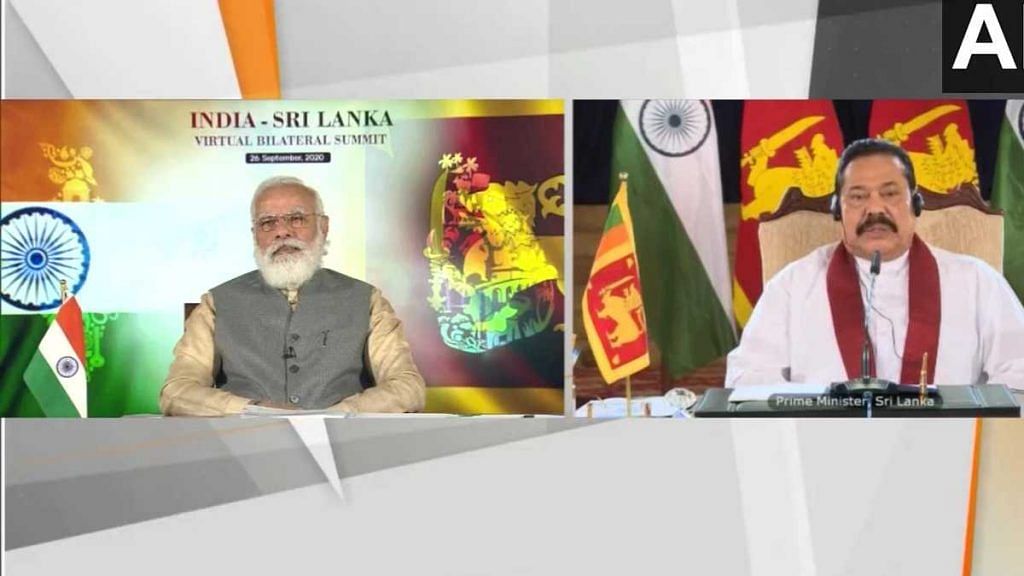New Delhi: Prime Minister Narendra Modi Saturday discussed India’s border standoff with China at the Line of Actual Control (LAC) in Ladakh with his Sri Lankan counterpart Mahinda Rajapaksa during a virtual bilateral meeting as both countries look for greater cooperation on defence and security ties.
This was the first-ever virtual bilateral summit between both the leaders since Rajapaksa won the elections in August registering a landslide victory. This was also Modi’s first such summit with a leader of a neighbouring country.
During the summit, which went on for about an hour, both sides “exchanged views on all issues”, said Amit Narang, Joint Secretary (Indian Ocean Region), Ministry of External Affairs (MEA), on being asked if the tensions between India and China were discussed, during a media briefing.
“The two prime ministers expressed satisfaction with the robustness of the security and defence cooperation between the two sides. They agreed to continue and further strengthen the mutual cooperation on personnel exchange and training, maritime security cooperation and India’s support to Sri Lanka in the spheres of defence and security,” Narang added.
Both sides also discussed greater maritime cooperation and security in the Indian Ocean region.
Rajapaksa, who was the President of Sri Lanka from 2005 until 2015, was infamous for his tilt towards China, much to India’s concern at that time.
Rajapaksa’s younger brother, Gotabaya Rajapaksa, is now the President of Sri Lanka.
Also read: With strong Rajapaksa govt in Sri Lanka, India to push big list of projects to boost ties
Sri Lanka seeks debt deferment
During the bilateral talks, PM Rajapaksa urged Modi to defer the debt the island nation owes to India.
“Technical discussions on Sri Lanka’s request for debt deferment are going on,” Narang said, adding that an additional request for a bilateral currency swap arrangement worth around $1 billion by the Sri Lankan side remains under discussion.
India has already provided a $400 million currency swap facility to the Central Bank of Sri Lanka in order to assist the country with its economic recovery and to tackle the Covid-19 related disruptions, the MEA said.
A currency swap is a transaction in which two parties exchange an equivalent amount of money with each other, but in different currencies. It helps in reducing the cost of borrowing in a foreign currency at favourable rates.
Under Rajapaksa’s tenure as Sri Lanka’s President, the country began to obtain heavy loans from China, paving the way for Beijing to take control of the strategic Hambantota Port in December 2018.
Unable to pay off the debt to the Chinese, the Sri Lankan government had then handed over the Hambantota Port on a 99-year lease in lieu of about $1.1 billion, keeping at stake the country’s sovereignty.
Also read: Sri Lanka to adopt ‘India first approach’ as new policy, says Foreign Secretary Colombage
On 13th constitutional amendment for Tamils
During the meet, Modi highlighted the need for an urgent implementation of the 13th amendment to the Sri Lankan Constitution that is aimed at “realising the expectations of Tamils for equality, justice, peace and dignity within a united Sri Lanka by achieving reconciliation nurtured by implementation of the Constitutional provisions,” Narang said.
“He (PM Modi) emphasised that implementation of the 13th amendment to the Sri Lankan Constitution is essential for carrying forward the process of peace and reconciliation,” he added.
India has been raising the issue with Sri Lanka ever since the Rajapaksa brothers came to power.
During their first bilateral meeting, Modi had raised the issue with President Rajapaksa when he visited India after assuming charge last November.
The 13th amendment to the Sri Lankan Constitution became part of the local statute as a direct result of the Indian intervention in 1987, under the India-Sri Lanka Accord. It proposed the establishment of a provincial council system and devolution of power for nine provinces in Sri Lanka.
However, none of the governments in Sri Lanka implemented the amendment since Colombo sees it as an Indian imposition.
Colombo Port Terminal project discussed
Modi and Rajapaksa also discussed the stalled $500 million deal under which India is expected to develop a container terminal in the Colombo Port in collaboration with Japan, the MoU for which was signed in May last year.
The terminal port assumes significance among all other infrastructure development projects that India is carrying out in Sri Lanka because the Colombo Port is also a part of the China’s Belt and Road Initiative.
Narang said the discussions on this issue were “positive and constructive” and both sides discussed an early implementation of such projects.
The project got stalled after President Rajapaksa decided to review it following severe criticism from the opposition parties for letting other countries develop the crucial port.
India Saturday also promised Sri Lanka a grant of $15 million for the development and promotion of Buddhist ties between both the countries.
Also read: Mahinda Rajapaksa brings family rule to Sri Lanka. All eyes on his India-China balancing act
